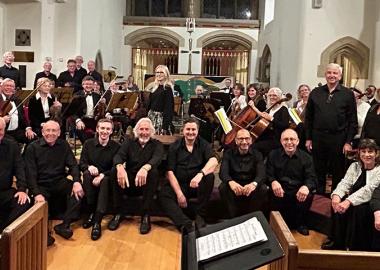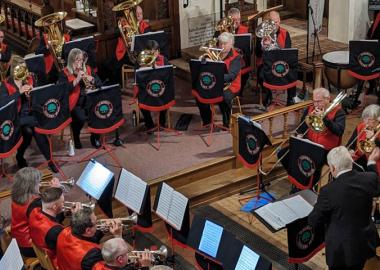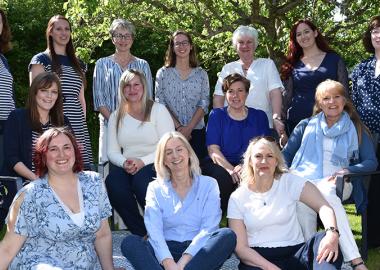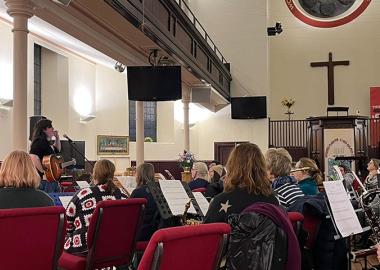In the first of four blog posts, composer Robert Laidlow discusses the rapid development of musical thoughts and directions for the AaC project with Southampton Concert Wind Band.
In this blog post I will speak about the initial thoughts, discussions and possible directions we have shared with one another, and how these will fundamentally influence the piece as I move forward with composing it. Later posts will include more detail about the music itself, focusing on elements that will (hopefully) be a collaborative synthesis of the pairing, about communicating new music, and about the rehearsal process – at least that’s the idea, but we haven’t yet reached these parts of the timeline. We will see…
Since the Adopt a Composer launch on 22 September, I have very quickly become familiar with Southampton Concert Wind Band (SCWB), from their enthusiastic and friendly members to the very wide range of repertoire they play at a very high standard.
The Adopt a Composer project has a very flexible duration, allowing composers and ensembles to work out exactly the best fit for the kind of work they are doing.
Some pairings will be writing until this time next year, but we decided very quickly that the band’s twenty-fifth anniversary concert on 18 May next year will be the ideal time to première a new work. This means that the piece needs to be ready to go well in advance of this date – and therefore that I need to get to work right away. Hence, my speedy assimilation into the band’s ways. Personally, I prefer an approach like this. I like to write a piece in one solid block, undisturbed by other composing work, so a relatively intense period of work with the band suits me very well.
I have visited the band twice now, and a third meeting is planned for mid-December. First, I simply came down to Southampton to watch one of their concerts and introduce myself during the rehearsal. I was struck, as mentioned above, by the wide variety of repertoire they performed extremely well, and the overall polished sound of the ensemble. I felt very encouraged that exploring new areas with the group would both be welcome and successful.

After this, I spent two weeks writing some very basic material that we could play through and discuss in a rehearsal. This rehearsal was not on their usual day, so I expected a small turnout – in fact, we must have had around 40 musicians, which I was totally floored by. Two weeks is, of course, not a very long time to write music for a large ensemble especially if, like me, you prefer to meticulously plan every element of a piece before you write any of it up properly.
Nonetheless, I took this opportunity to introduce the band members to the kind of ideas I am interested in when writing music – a sort of repayment for their introduction at the concert two weeks earlier. They played through the two excerpts wonderfully (even when one or two parts were in my own handwriting: halfway to Southampton I realised my computer hadn’t printed the euphonium part – so I had to rewrite it onto a bit of spare paper – well done euphonium section!), and we took a long break in the middle of the rehearsal to have a roundtable discussion of ideas. I was especially interested to learn about anything the band felt they had the potential to try but had never found the opportunity to do so.
I have a long list of replies, but safe to say they were in some cases even more 'experimental' than my ideas, which is very rarely the case when working with non-professional groups! This is fantastic and has given me many places to develop ideas from, and areas where our collective interests can be explored.
During this discussion, we had a fruitful conversation about why they might play something in a concert and what effect a piece might have on an audience – this is especially important given the celebratory nature of the concert.
Since the rehearsal I have been hard at work on this piece and have made what I feel is some very good progress. There is no doubt the combination of these initial sessions with the band has already influenced my work, and I expect this to only increase as we begin working on material that moves towards the final result.
Follow composer Robert Laidlow on Twitter and Facebook.
Follow Southampton Concert Wind Band on Twitter and Facebook.
Keep up to date with Making Music via Twitter and Facebook, and join fellow members in the online community.









